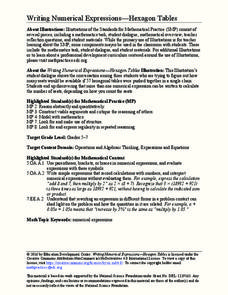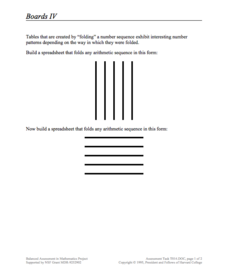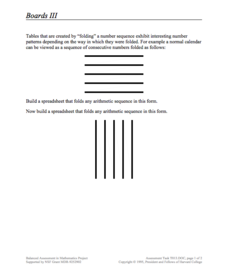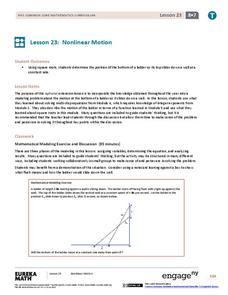Scholastic
Study Jams! Number Patterns
Finding patterns is an essential skill for mathematicians of all ages. Follow along with Zoe as she walks step-by-step through the process of identifying and completing number patterns. Work through the Try It! problems as a whole class...
Curated OER
Multiplies of 9 #2
Reinforce the multiplying by nine as a number pattern. After completing sequences of the multiples of nine, pupils decipher a pattern in the entire nine times tables. Finally, they write down any patterns that they see. A great way to...
Curated OER
Patterns and Algebra - Modeling
Seventh grade math is so much fun! They solve 10 different problems that include using patterns to complete a table, describe the pattern, and identify the specific term in the pattern for each. Then they give a description of the...
Curated OER
Multiples of 6 #2
Count by six with these helpful activities. After completing number sequences and multiplication problems from the six times table, third graders solve problems that are written out at the bottom of the page. An excellent way to work on...
Curated OER
Sunshine Math - 3
In this math review worksheet, students answer 5 word problems involving patterns and algebraic reasoning. Students then answer 1 story problem about the perimeter of a triangle. Next, students examine a graph and answer a 4 part fill...
Curated OER
MT-A315I introduction to Linear Algebra
In this linear algebra worksheet, students apply the basics of algebraic reasoning to evaluate different expressions looking for the pattern of finding the unknowns.
EngageNY
Dividing by (x – a) and (x + a)
Patterns in math emerge from seemingly random places. Learners explore the patterns for factoring the sum and differences of perfect roots. Analyzing these patterns helps young mathematicians develop the polynomial identities.
Education Development Center
Writing Numerical Expressions—Hexagon Tables
Explore a basic pattern to practice writing expressions. In collaborative groups, learners examine a contextual pattern and write an expression to model it. The task encourages groups to describe the pattern in multiple ways.
EngageNY
Why Do Banks Pay YOU to Provide Their Services?
How does a bank make money? That is the question at the based of a lesson that explores the methods banks use to calculate interest. Groups compare the linear simple interest pattern with the exponential compound interest pattern.
Noyce Foundation
Double Down
Double the dog ears, double the fun. Five problems provide increasing challenges with non-linear growth. Topics include dog ears, family trees and population data, and geometric patterns.
Concord Consortium
Boards IV
Build a connection between algebraic sequences and spreadsheets. Learners examine a specific folding pattern and convert the pattern into a spreadsheet. The goal of the spreadsheet is to produce a sequence of a specific pattern modeled...
Concord Consortium
Boards III
Learn to visualize mathematical patterns as a folded pattern. Beginning with a visual display, the task encourages pupils to view sequences as a folded table. The pattern of the table then becomes a formula in a spreadsheet that...
Curated OER
Problem Solving Patterns
In this problem solving patterns worksheet, 6th graders solve and complete 2 various types of problems. First, they identify what the 4n represents in each block pattern illustrated. Then, students determine the number of arrows added to...
Mathematics Assessment Project
Middle School Mathematics Test 6
A thorough math test divides the content into two 40-minutes sections, covering material through algebra and geometry. Problems incorporate analysis and applied problem solving.
Curated OER
Grade 3-Math Patterns
In this grade 3 patterns worksheet, 3rd graders answer a set of 13 multiple choice questions, finding missing numbers in and completing patterns. Answers may be submitted and checked on-line.
EngageNY
Successive Differences in Polynomials
Don't give your classes the third degree when working with polynomials! Teach them to recognize the successive differences and identify the degree of the polynomial. The activity leads learners through a process to develop an...
EngageNY
Structure in Graphs of Polynomial Functions
Don't allow those polynomial functions to misbehave! Understand the end behavior of a polynomial function based on the degree and leading coefficient. Learners examine the patterns of even and odd degree polynomials and apply them to...
Math Stars
Math Stars: a Problem-Solving Newsletter Grade 7
Put on your thinking caps because middle school math has never been more interesting in this huge resource full of thought provoking questions. Written as a newsletter, the resource has 10 two-page newsletters with a variety of...
Noyce Foundation
Tri-Triangles
Develop an understanding of algebraic sequences through an exploration of patterns. Five leveled problems target grade levels from elementary through high school. Each problem asks young mathematicians to recognize a geometric pattern....
Education Development Center
Integer Combinations—Postage Stamps Problem (MS Version)
Number patterns can seem mysterious. Help your learners unravel these mysteries as they complete an intriguing task. Through examination, collaborative groups determine that they are able to produce all integers above a certain...
Charleston School District
Pythagorean Theorem and Converse
You've heard that it is true, but can you prove it? Scholars learn the Pythagorean Theorem through proof. After an overview of proofs of the theorem, learners apply it to prove triangles are right and to problem solve. This is the second...
EngageNY
Nonlinear Motion
Investigate nonlinear motion through an analysis using the Pythagorean Theorem. Pupils combine their algebraic and geometric skills in the 24th lesson of this 25-part module. Using the Pythagorean Theorem, scholars collect data on the...
CK-12 Foundation
Exponential Decay: Cool Sunglasses
Who wouldn't want to wear four pairs of sunglasses? Each pair of sunglasses reduces the percent of incoming light by one-half. An interactive tutorial helps young mathematicians build a graph that models this scenario. They...
Mathematics Vision Project
Module 3: Polynomial Functions
An informative module highlights eight polynomial concepts. Learners work with polynomial functions, expressions, and equations through graphing, simplifying, and solving.























